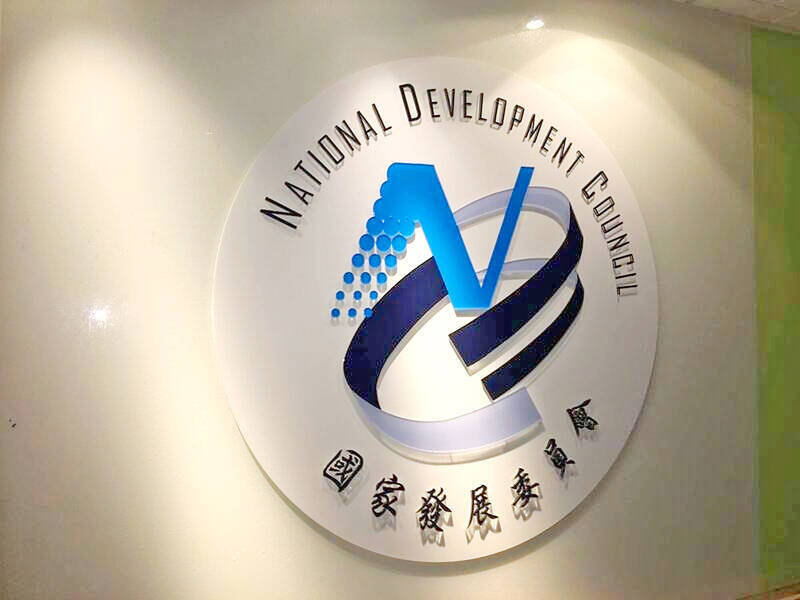A draft bill for an around-the-nation high speed rail system (環島高速鐵路建設特別條例) would cause confusion among administrative agencies and should not be enacted, the National Development Council (NDC) said yesterday.
The bill was proposed by Chinese Nationalist Party (KMT) Legislator Fu Kun-chi (傅崑萁) and is to be jointly reviewed today by the Economics and Transportation committees.
Fu also proposed a bill on the construction of an extension of the Shuishalian Freeway (Freeway No. 6), further east to Hualien.

Photo: Wu Hsin-tien, Taipei Times
Legislative Speaker Han Kuo-yu (韓國瑜) and Deputy Legislative Speaker Johnny Chiang (江啟臣) co-sponsored bills on the around-the-island high-speed rail system and the extension of Freeway No. 6. The bill also proposed that the council would be in charge of enforcing the draft statute.
The Ministry of Transportation and Communications oversees the operations of the high-speed rail system, including constructions of extension lines to Yilan and Pingtung counties, the council said.
If the NDC enforces the draft statute, its authority would clash with the Railway Bureau’s, which is the regulatory agency for the high-speed railway system, as per the Railway Act (鐵路法), the council said, adding that it would result in multiple agencies engaging in oversight of the high-speed rail system.
“The draft bill would lead to chaos in terms of long-term development transportation projects and affect efficiency and distribution of administrative resources,” it said.
Public construction projects approved by the Executive Yuan should be funded by the government budget in accordance with procedures for the implementation of the preliminary work of the government’s public construction, the council said.
Aside from preparing for the required budget, government agencies should maintain financial soundness through revenue and expenditure control, it added.
The council said the bill is incompatible with the Railway Act, the Financial Discipline Act (財政紀律法) and the Organic Act of the National Development Council (國發會組織法).
Taiwan already has experience in building a high-speed railway system, so it is not appropriate to enact a new law for it or assign the NDC to serve as the administrative authority for the high-speed railway around the island, it said.
The two bills, which would require a budget of up to NT$1 trillion, were serious infringements to administrative power, Democratic Progressive Party (DPP) caucus whip Ker Chien-ming (柯建銘) said.

The first global hotel Keys Selection by the Michelin Guide includes four hotels in Taiwan, Michelin announced yesterday. All four received the “Michelin One Key,” indicating guests are to experience a “very special stay” at any of the locations as the establishments are “a true gem with personality. Service always goes the extra mile, and the hotel provides much more than others in its price range.” Of the four hotels, three are located in Taipei and one in Taichung. In Taipei, the One Key accolades were awarded to the Capella Taipei, Kimpton Da An Taipei and Mandarin Oriental Taipei. Capella Taipei was described by

The Taichung District Court yesterday confirmed its final ruling that the marriage between teenage heir Lai (賴) and a man surnamed Hsia (夏) was legally invalid, preventing Hsia from inheriting Lai’s NT$500 million (US$16.37 million) estate. The court confirmed that Hsia chose not to appeal the civil judgement after the court handed down its ruling in June, making the decision final. In the June ruling, the court said that Lai, 18, and Hsia, 26, showed “no mutual admiration before the marriage” and that their interactions were “distant and unfamiliar.” The judge concluded that the couple lacked the “true intention of

EVA Airways today confirmed the death of a flight attendant on Saturday upon their return to Taiwan and said an internal investigation has been launched, as criticism mounted over a social media post accusing the airline of failing to offer sufficient employee protections. According to the post, the flight attendant complained of feeling sick on board a flight, but was unable to take sick leave or access medical care. The crew member allegedly did not receive assistance from the chief purser, who failed to heed their requests for medical attention or call an ambulance once the flight landed, the post said. As sick

INDUSTRY: Beijing’s latest export measures go beyond targeting the US and would likely affect any country that uses Chinese rare earths or related tech, an academic said Taiwanese industries could face significant disruption from China’s newly tightened export controls on rare earth elements, as much of Taiwan’s supply indirectly depends on Chinese materials processed in Japan, a local expert said yesterday. Kristy Hsu (徐遵慈), director of the Taiwan ASEAN Studies Center at the Chung-Hua Institution for Economic Research, said that China’s latest export measures go far beyond targeting the US and would likely affect any country that uses Chinese rare earths or related technologies. With Japan and Southeast Asian countries among those expected to be hit, Taiwan could feel the impact through its reliance on Japanese-made semi-finished products and